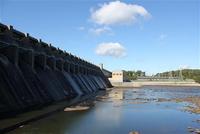-
Natural gas saves water, reduces drought vulnerability
A new study finds that in Texas, the U.S. state that annually generates the most electricity, the transition from coal to natural gas for electricity generation is saving water and making the state less vulnerable to drought. Even though exploration for natural gas through hydraulic fracturing requires significant water consumption in Texas, the new consumption is easily offset by the overall water efficiencies of shifting electricity generation from coal to natural gas. The researchers estimate that water saved by shifting a power plant from coal to natural gas is 25 to 50 times as great as the amount of water used in hydraulic fracturing to extract the natural gas.
-
-
Climate scientists say renewables are not enough
Some of the world’s top climatologists have declared their support for nuclear energy as a complementary energy source, alongside wind and solar as energy, which would cut fossil fuel pollution and reduce the growth of global warming. The scientists say that opposing fossil fuels and promoting renewable energy sources offer but a limited solution.
-
-
Water shortage hobbles expansion of shale gas drilling

Many point to the large reserves of shale gas as promising U.S. energy independence in the near future. Extracting shale gas, however, requires huge amounts of water, and growing water shortages have already led to conflicts over water use between shale gas developers and farmers. Such conflicts are only going to intensify.
-
-
Microbial power storage can do the job
Oil and gas can be converted into electricity in line with demand, but wind, water, and sun cannot be adapted as readily to fluctuations in power consumption. Efficient power storage solutions must satisfy two essential criteria: Their own consumption of resources must be as low as possible, and surplus power must be stored within seconds. The results of a pilot study have now demonstrated that a microorganism-based process developed by is unequalled in the way it satisfies both of these criteria.
-
-
Harvesting carbon dioxide to produce electricity
Electric power-generating stations worldwide release about twelve billion tons of CO2 annually from combustion of coal, oil, and natural gas. Home and commercial heating produces another eleven billion tons. Researchers developed a technology which would make the CO2 react with water or other liquids and, with further processing, produce a flow of electrons that make up electric current.
-
-
Quebec deadly accident revives pipeline vs. rail debate

The sharp increase in U.S. domestic oil production in the last four years, and the opening by the Obama administration of new areas for drilling, have greatly benefitted U.S. rail companies, which now enjoy the added business of transporting oil from places where pipelines do not exist.U.S. domestic shipments of oil have increased from 9,500 carloads in 2008 to more than 230,000 carloads last year. The deadly Lac-Megantic, Quebec crude-oil train accident revives the debate about the relative safety merits of two modes of transporting oil over long distances – rail vs. pipeline. Proponents of the Keystone XL pipeline project say the Quebec accident will boost support for their cause.
-
-
Policy, regulatory issues hobble hydropower as wind-power backup

Theoretically, hydropower can step in when wind turbines go still, but barriers to this non-polluting resource serving as a backup are largely policy- and regulation-based, according to researchers.
-
-
Smarter energy use by industry could cut U.K. electricity demand by 75 percent
As the U.K. government debates the U.K. Energy Bill, new research has found that turning down non-essential services, such as heating, air-conditioning, and pumping equipment, at times of peak electricity demand could play a far greater role in helping the United Kingdom achieve future energy security.
-
-
GOP lawmakers urge Obama not to link Keystone decision to climate policies
Democrats who are uncomfortable with the Keystone XL pipeline have urged President Obama to consider attaching policies requiring cuts in greenhouse gases emissions to his approval of the project. Republican lawmakers are urging the president not to link approval of Keystone to climate change policies.
-
-
Wind and solar power, paired with storage, would be cost-effective way to power grid
Renewable energy could fully power a large electric grid 99.9 percent of the time by 2030 at costs comparable to today’s electricity expenses, new research says; a well-designed combination of wind power, solar power, and storage in batteries and fuel cells would nearly always exceed electricity demands while keeping costs low, the study authors found
-
-
Detection aircraft surveys 600 miles of PG&E California pipeline for gas leaks
PG&E’s transmission pipeline is routinely surveyed each year, typically by ground crews; accessing rural areas with difficult terrain, however, can be time consuming, expensive, and unsafe for crews on the ground; aerial surveys often look for dead vegetation as an indicator of gas leaks
-
-
Dallas area earthquakes were caused by fracking: geophysicists
Three earthquakes that hit a Dallas suburb last week could be connected to fracking operations, according to a local geophysicist who studies earthquakes in the region; the earthquakes were considered minor, with the biggest one registered at a 3.4 on the Richter scale; no injuries were reported despite many emergency calls
-
-
Carbon capture and storage likely to cause earthquakes
Carbon capture and storage, or CCS, is a major component of the world’s greenhouse gas reduction strategy; to make a significant contribution to emission reduction, however, CCS would need to operate on a massive scale, potentially sequestering upward of 3.5 billion metric tons of CO2 each year; researchers say that the injection of massive quantities of CO2 would be likely to induce small temblors which would break the reservoirs’ seals and release the stored CO2 into the atmosphere
-
-
Fracking poses low risk for causing earthquakes

Fracking has a low risk for inducing earthquakes that can be felt by people, but underground injection of wastewater produced by hydraulic fracturing and other energy technologies has a higher risk of causing such earthquakes, says a new report
-
-
Energy-dense biofuel from cellulose may well be economical
Researchers developed a process for creating biofuels which holds the promise of being cost-effective for production scale, opening the door for moving beyond the laboratory setting
-
- All
- Regional
- Water
- Biometrics
- Borders/Immig
- Business
- Cybersecurity
- Detection
- Disasters
- Government
- Infrastructure
- International
- Public health
- Public Safety
- Communication interoperabillity
- Emergency services
- Emergency medical services
- Fire
- First response
- IEDs
- Law Enforcement
- Law Enforcement Technology
- Military technology
- Nonlethal weapons
- Nuclear weapons
- Personal protection equipment
- Police
- Notification /alert systems
- Situational awareness
- Weapons systems
- Sci-Tech
- Sector Reports
- Surveillance
- Transportation
Advertising & Marketing: advertise@newswirepubs.com
Editorial: editor@newswirepubs.com
General: info@newswirepubs.com
2010-2011 © News Wire Publications, LLC News Wire Publications, LLC
220 Old Country Road | Suite 200 | Mineola | New York | 11501
Permissions and Policies
Editorial: editor@newswirepubs.com
General: info@newswirepubs.com
2010-2011 © News Wire Publications, LLC News Wire Publications, LLC
220 Old Country Road | Suite 200 | Mineola | New York | 11501
Permissions and Policies
